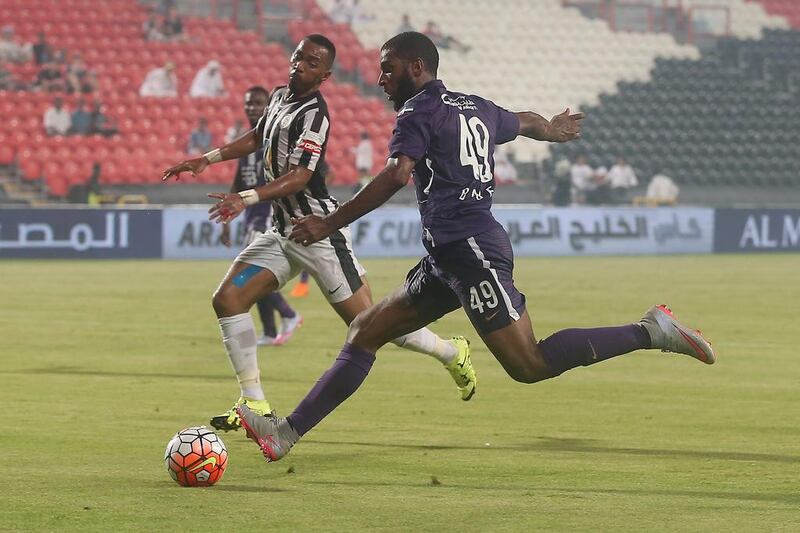When you find yourself in a hole, it is advisable to stop digging.
How new Al Ain signing Ryan Babel must wish he could have heeded such words. Not for the first time in his career, the 28-year-old winger has found himself in the middle of a Twitter controversy, and this time he has outraged women around the world.
Stung by criticism from a female football fan, the Dutchman unleashed a series of progressively damning tweets that turned a minor argument into a global story.
“Ur a girl … Stay in ur lane.”
“At least let your brother or your boyfriend make the comment then we can argue.”
It got worse.
“Not gonna argue with a lil girl, with all the respect. C’mon now.”
“It’s very simple … I personally not gonna argue with a girl about football. U don’t have to make it bigger than it is.”
That could be said for that hole you dug for yourself, Ryan.
Read more:
[ – ‘Stay in your lane’: Al Ain forward Ryan Babel causes Twitter sexism storm ]
[ – Emmanuel Emenike, Denilson, Ryan Babel and more: 10 new faces to watch in the AGL ]
Babel is no stranger – indeed, he is a bit of pioneer – when it comes to the footballer-in-a-Twitter-storm genre.
In 2011, Babel, who was then at Liverpool, posted a photo-shopped image of referee Howard Webb in a Manchester United shirt after an FA Cup match.
“And they call him one of the best referees? That’s a joke. SMH,” he tweeted.
He became the first professional footballer to be charged and found guilty of making inappropriate comments on Twitter and was fined £10,000 (Dh56,400) by the English Football Association.
While that incident could be dismissed as naivete on Babel’s part, his latest comments are more serious.
The rise of social media has brought down PR barriers between players and fans.
Suddenly, footballers, often so dull and charisma-free in front of television cameras, are left to their own mobile devices.
This direct engagement has produced a mixture of the good, bad and outright ugly on Twitter. It must be pointed out that players receive far more vitriol than they dish out, and the likes of Mario Balotelli, Stan Collymore and Babel himself have been on the end of some horrific racist abuse on Twitter.
None of which, of course, excuses the Al Ain winger’s words, or the underlying sexism that still plagues football.
The English FA, ironically, got itself in trouble with an unfortunate tweet following England’s success at the recent Fifa Women’s World Cup in Canada.
“Our #Lionesses go back to being mothers, partners and daughters today, but they have taken on another title – heroes,” the FA’s official account posted.
The tweet was deleted when the predictable backlash arrived.
It is not just those cooped up in the macho world of football who come across as dinosaurs.
In June, renowned scientist Tim Hunt resigned an honorary post at University College London after advocating gender-segregated labs in a speech and saying the trouble with “girls” is that “three things happen when they are in the lab … You fall in love with them, they fall in love with you and when you criticise them, they cry.”
Twitter users, not surprisingly, savaged him. He apologised and claimed that he had received plenty of support from women around the world. But the damage had been done, and if a 72-year-old Nobel Prize winner can be this reckless, perhaps we should not be too shocked when footballers air their own views.
In fairness to Babel, he has offered several qualified apologies and continues to engage with his critics on Twitter and Snapchat, as well offering to answer questions via text. Whether that will be enough to earn him forgiveness remains to be seen.
In his book So You’ve Been Publicly Shamed, author Jon Ronson tackles the phenomenon of outrage over what the online community perceives as racist or misogynist tweets.
Often these tweets are taken out of context – not too difficult in a world of 140-character sound bites – and Ronson gives examples of seething mobs destroying the credibility or careers of tweeters guilty of nothing more than badly-worded jokes or, as in the FA tweet, genuine comments.
This is not the case here. Babel cannot claim to be misunderstood, and he lost any benefit of the doubt after initially eschewing opportunities to retract his words definitively.
Perhaps an official apology will help stop this story from getting bigger and bigger, like the hole in which Babel now finds himself.
akhaled@thenational.ae
Follow us on Twitter at NatSportUAE





